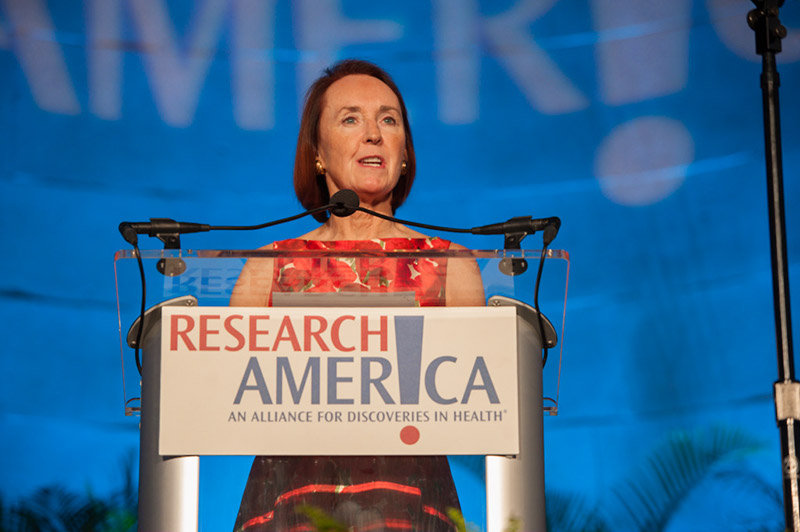What Future are We Building?

Dear Research Advocate,
Warning — Bad News First: On Tuesday, the Administration notified the United Nations of its intent to withdraw the U.S. from the World Health Organization (WHO). The withdrawal would not be effective until July 6, 2021, but the timing is cold comfort given the message it sends and the rickety path it implies for our nation’s COVID-19 response. Research!America signed on to a letter asking Congress to take action to stop the withdrawal, and we will continue to make the case that social distancing does not mean global distancing.
Unfortunately, this isn’t the only recent Administration action that contravenes American values and interests. The U.S. Department of Homeland Security announced that foreign students attending schools operating completely online may not take an online course load and stay in the U.S. The implications of this policy change are profoundly negative, as is — once again — the message it sends. We signed on to an open letter asking that the policy be withdrawn immediately. You can sign your organization on here.
Championing R&D: We were honored that Congressman Tom Cole (R-OK), Ranking Member of the House Labor-HHS Appropriations Subcommittee, joined our alliance members on Tuesday. Equating COVID-19 to a “biomedical Pearl Harbor,” Rep. Cole emphasized that we “need to spend billions to save trillions,” investing robustly in the public-private sector effort to develop and distribute a safe and effective COVID-19 vaccine and acting now to outpace the next global health threat. He is an extraordinary champion for health and research for health.
In Case You Missed It: The webcast is available here of a House Budget Committee hearing focused on the federal role in U.S. R&D and featuring such esteemed witnesses as AAAS CEO Dr. Sudip Parikh (a Research!America Board Member). For a visualization of the public and private sector roles in R&D, check out and share this Research!America infographic.
Also on Capitol Hill: The House Appropriations Subcommittees kicked off their FY21 markups this week, moving several bills forward. The Labor-HHS Subcommittee has proposed $42 billion for NIH, a $500 million increase in annual appropriations. Additionally, the bill proposes one-time emergency funding of $5 billion that can be used to help restore COVID-19-eroded NIH grant dollars. CDC would receive a $232 million increase in annual appropriations and $9 billion in emergency funding.
Unfortunately, this amalgamation of annual and one-time funding would still leave NIH and CDC inadequately equipped to address COVID-19 and advance other U.S. health priorities. The annual funding is insufficient and in the case of NIH, the emergency spending level is less than half the amount needed to restore FY20 research grant funding eroded by COVID-19. AHRQ would receive a $5 million increase, but no emergency spending despite the need for evidence upon which to base decisions about the upheavals in U.S. healthcare COVID-19 has wrought.
The Ag-FDA and CJS Subcommittees also advanced their appropriations bills. The Ag-FDA Subcommittee proposed $3.2 billion in discretionary funding for the FDA, a non-user fee increase of just $40.8 million (less than half of the community’s requested increase), while the CJS Subcommittee proposed $8.55 billion for NSF, an increase of $270 million (compared to the research community’s requested increase of $720 million).
As we emphasized in our statement about these bills, it is abundantly clear that House appropriators were trying to advance the best interests of our nation, but were blocked by a grossly insufficient, pre-pandemic budget cap that chokes off urgently needed annual budget increases.
There is another way. As appropriations leaders from both sides of the aisle have advised, federal agencies and programs entrenched in COVID-19 response could be made exempt from the budget caps. Bifurcating the budget to allow the federal government to fight COVID-19 while meeting other national needs would signal that our nation is reclaiming our future from COVID-19: a bold budget would affirm that we will withstand the pandemic’s damage and will not abide defeat.
Reach out to your Members of Congress to encourage them to take a stand against a pre-pandemic budget cap that is wildly out of step with the challenges we face.
Contributing to Trusted Resources: The EveryLife Foundation is conducting a National Burden of Rare Disease Survey and wants to hear from you about the true cost of rare diseases. The survey is open until Sunday, July 19, 2020.
For Alliance Members: Join us next week on Monday, July 13, 2020, from 1-1:30 p.m. ET with Gary Gibbons, MD, Director of the National Heart, Lung, and Blood Institute (NHLBI) at NIH. Dr. Gibbons will discuss NHLBI’s COVID-19 response; racial and ethnic disparities, and the effect of COVID-19 on research outside the pandemic’s sphere. Register now.
Stay well, stay safe, and stay connected.
Sincerely,
Mary Woolley




